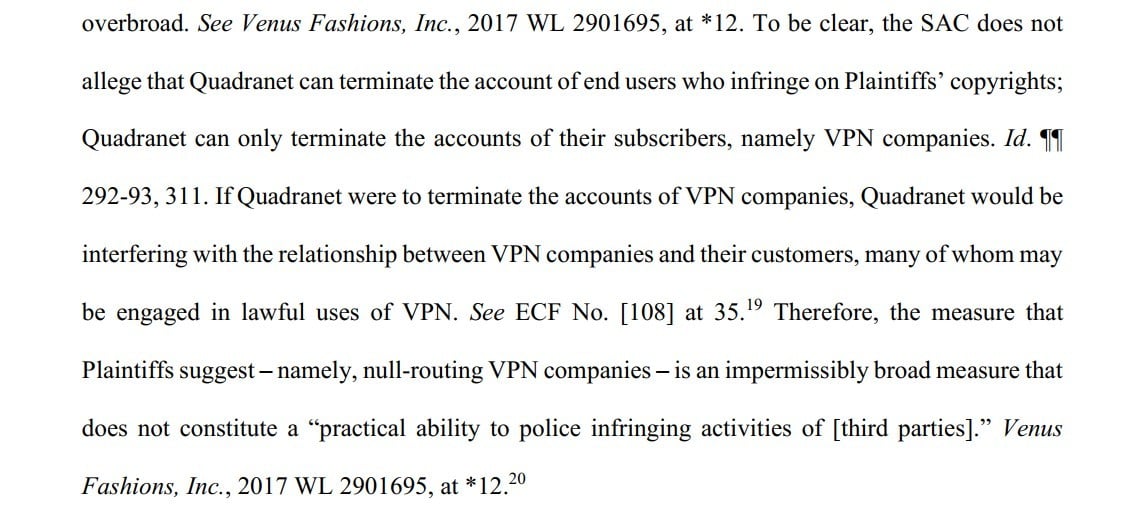A group of independent film companies has taken the piracy liability issue to a new level this year.
After targeting site operators and individual pirates, the makers of films such as “London Has Fallen”, “Outpost” and “Dallas Buyers Club” started going after VPN providers. They didn’t stop there either.
Over the past few months, several hosting companies have been sued as well. This includes the Californian hosting company Quadranet which leased servers to VPN provider LiquidVPN.
The filmmakers argued that the hosting company can be held liable for copyright infringement because some LiquidVPN subscribers were pirating. Quadranet should have taken appropriate action after receiving repeated copyright infringement warnings, they said.
For example, the hosting provider could have cut off the power cord or null-routed the IP addresses of LiquidVPN’s server. In addition, it could have terminated its agreement with the company.
Quadranet Denied Piracy Allgetions
Quadranet vehemently disagreed with the accusations. Through a motion to dismiss, the company challenged the filmmakers’ claims, including the allegation that it is contributorily and vicariously liable for the alleged piracy activities.
Null-routing IP addresses would mean effectively pulling the plug on all LiquidVPN subscribers, including those who use the service for legitimate purposes, it countered.
The hosting provider sees itself as a neutral service provider and it told the court that it’s at least two steps removed from any ‘involvement’ in the alleged copyright infringements.
Court Sides With Quadranet
After allowing the filmmakers to amend their complaints to address potential deficiencies in their pleading, the Florida federal court ruled on the motion to dismiss this week. This resulted in a clear victory for the hosting provider.
District Court Judge Beth Bloom concluded that there isn’t sufficient ground to argue that Quadranet is liable for contributory copyright infringement. This would require the rightsholders to show that culpable intent was involved, which isn’t the case here.
The filmmakers cited jurisprudence that shows that third-party services can be required to take ‘appropriate’ action if they are made aware of infringing activity. However, in this case, the court concludes that Quadranet was not aware of any specific infringements since the pirated traffic was encrypted.
“The [complaint] instead alleges that Quadranet provides servers to VPN companies. Quadranet notes that VPN companies encrypt their clients’ (‘end users’) online activity, which means Quadranet was never aware of the end users’ online activity on Quadranet’s servers.
“As such, even if Plaintiffs sent notices of copyright infringement to Quadranet, which neither Party disputes, Quadranet was unaware of any specific infringing activity,” Judge Bloom adds, while dismissing the contributory infringement claim.
No Vicarious Copyright Infringement Either
The filmmakers’ second copyright claim relates to ‘vicarious’ infringement. They argued that the hosting company purposefully failed to update Whois records, which was seen as an appealing feature by VPN companies that have pirating subscribers.
To back up this allegation, the rightsholders had to show that Quadranet directly profited from the piracy activities and that it had the right and ability to control the alleged infringements.
According to the court, this is not the case. VPN providers such as LiquidVPN would pay for the servers regardless of any piracy activity, Judge Bloom notes.
“VPN companies, not the end users, paid Quadranet for its services, and it is apparent that Quadranet was paid by the VPN companies regardless of whether the end users engaged in infringing activities or legitimate activities.”
Similarly, the hosting provider didn’t have any straightforward options to stop or control the infringing activities either. Disconnecting or null routing the servers is not seen as a viable option, as that would affect legitimate VPN users too.
“If Quadranet were to terminate the accounts of VPN companies, Quadranet would be interfering with the relationship between VPN companies and their customers, many of whom may be engaged in lawful uses of VPN.
“Therefore, the measure that Plaintiffs suggest – namely, null-routing VPN companies – is an impermissibly broad measure that does not constitute a ‘practical ability to police infringing activities of [third parties]’,” Judge Bloom adds, citing jurisprudence.

Dismissed With Prejudice
Based on these and other arguments, the court decided to dismiss the complaint. The filmmakers previously requested to have the option to file an amended version to correct any failures but this request was denied as well.
District Court Judge Bloom writes that the plaintiffs already had two opportunities to file an amended complaint and doesn’t believe another shot is warranted. As such, the complaint is dismissed with prejudice.
“Considering the Parties’ arguments and Plaintiffs’ previous opportunities to amend the complaint, a third opportunity to amend the complaint would be futile, and Plaintiffs’ third amended complaint would likely not survive another motion to dismiss,” Judge Bloom writes.
This outcome is a major victory for Quadranet. The filmmakers, for their part, will be disappointed. However, they still have several other cases pending against VPN providers, hosting companies, and ISPs. So we will likely hear from them again in the near future.
—
A copy of U.S. District Court Judge Beth Bloom’s order on Quadranet’s motion to dismiss is available here (pdf)
From: TF, for the latest news on copyright battles, piracy and more.
Source : Hosting Company Defeats Filmmakers’ “VPN Piracy” Lawsuit in Court











